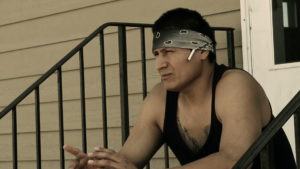 Missed Madison Film Festival
Missed Madison Film Festival
The Seventh Fire | John P. Riccobono | USA | 2015 | 76 minutes
Four Star | Madison Public Library | Amazon Video | Google Play
WUD Film member Vincent Mollica looks at The Seventh Fire, a portrait of an Ojibwe community in Minnesota, and suggests ways in which director John P. Riccobono transforms his portrait of an aging gang leader in order to look beyond statistics.
The Seventh Fire explores an Ojibwe community in Minnesota today, specifically looking at Rob Brown, an older gang leader, and Kevin Fineday, a 17-year-old making many of the mistakes Rob has made.
In a White House panel discussion, director Jack Pettibone Riccobonno talks honestly about his political intentions for the film. He wanted to foreground the human beings behind the “stats” we see and hear about Native American communities. It may be natural to be suspect of Riccobonno, a white Harvard grad, talking about this interest in authentic representation. However, true to Riccobonno’s goals, the film provides an immersive look at two human beings in a contemporary Native American community. The film takes figures whose experience might otherwise be reduced to these statistics and designs individual scenes and sequences to allow us to the see humans rather than subjects.
The film follows Rob as he is imprisoned for a fifth time, and at the film’s conclusion we see him in jail. Near the end we see him sitting alone eating, with a voice over saying how he was a “bad example” and how he wants to help create change. Then Rob talks to the camera about “tradition,” and the sequence expands to his description of a novel he’s writing and the freeing power of writing. Rob researches the Ojibwe people in the library. As he discusses the meaning of his name and his potential to warn others of danger, we see footage of a lake and an empty park.
One can imagine this moment ending at Rob describing his unhappiness and his desire to change his ways. What if we just saw Rob the prisoner, realizing the error of his ways too late? It would fit in a story Riccobonno purposefully set out not to tell, showing a subject in prison, just an indicator of a larger social problem. (He’s even mentioned this point, saying that many stories usually don’t even go into the prison.) This would be an example of the “stats” approach Riccobonno refers to in the White House panel discussion, which serves as a great supplement to the film because it goes much deeper into the greater political context surrounding what we see.
Instead, additional footage and VO is added not just to show how Rob has changed, but how his experience impacts Rob’s creativity and his sense of heritage. The film concentrates information to ultimately create a much richer and more engaging picture.
Riccobonno juxtaposes very different scenes, evocatively uses voice over, or simply lets a scene go on longer than necessary to get a richer sense of character within a short space of time. He rarely forces us see one of these characters as just one, defining, thing, reduced to an anonymous drug dealer or prisoner. A scene of Kevin doing drugs with his friends in an apartment is juxtaposed with a scene of him hanging out with those friends at a parade. Kevin talking to the camera about the hopelessness of the community is done in part as VO of Kevin helping a young girl ride her bike. In drawing scenes out like this, juxtaposing scenes, and using voiceovers, the film frequently moves beyond what we might see as “stats” and see the human being behind them.
Ultimately, Riccobonno uses techniques that provide the viewer more information about the characters on screen in a small amount of time to transform the material and its impact beyond just liberal rhetoric.
Check out the other Missed Madison Film Festival reviews for Wednesday, January 25:
Julieta reviewed by Jason Furhman (Cinesthesia programmer) at Madison Film Forum»
Fire at Sea reviewed by James Kreul at Madison Film Forum»
Demon reviewed by Grant Phipps at LakeFrontRow»
Editor’s Note: Vincent Mollica serves as the Starlight Associate Director at WUD Film. Starlight Cinema presents Ae Dil Hai Mushkil tomorrow tonight and How to Tell You’re a Douchbag on February 2 at Union South Marquee Theatre.